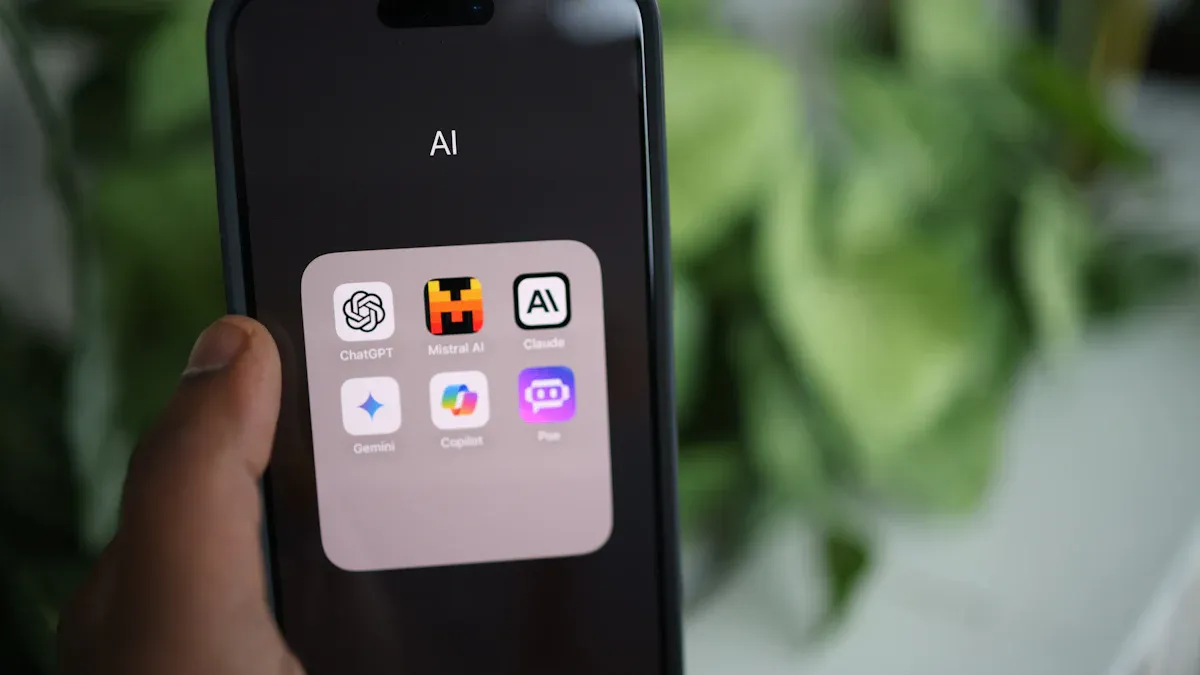
Is an ai phone system worth the price in 2025? You will see more businesses using ai to boost service and save time. The cost of an ai phone system can range from affordable to luxury, depending on your business needs. You should think about what features matter most for your business and how ai can help you reach your goals. Some businesses choose standard solutions, while others want luxury options with advanced ai features.
Key Takeaways
-
AI phone systems improve customer service by answering calls quickly, understanding callers, and working 24/7 without breaks.
-
These systems offer advanced features like voice recognition, sentiment analysis, multilingual support, and real-time analytics to boost efficiency and security.
-
Costs vary widely, from affordable monthly plans for small businesses to custom solutions for large enterprises; always check for hidden fees and total expenses.
-
Using AI phone systems can save money by reducing labor costs, scheduling errors, and overtime while increasing employee satisfaction and customer loyalty.
-
Choose an AI phone system that fits your business needs by reviewing features, pricing, security, and vendor support; testing with a pilot program helps ensure a good fit.
AI Phone System Overview
What Is an AI Phone System
An ai phone system uses artificial intelligence to manage and improve your business calls. You can think of it as a smart upgrade to traditional phone systems. Instead of only making and receiving calls, this system uses ai to understand, process, and respond to callers in real time. You get more than just a phone line. You get a tool that can answer questions, route calls, and even analyze conversations for better service.
Recent market trends show that more companies now use ai in their phone systems. Businesses want to improve customer experience and save time. Many companies plan to use ai-powered chatbots and virtual assistants for customer service by 2025. These tools help you offer instant, personalized, and 24/7 support. As a result, the ai phone system is becoming a popular choice for businesses that want to stay ahead.
Key Features
You will find many advanced features in a modern ai phone system. Here are some of the most important:
-
Voice Recognition and Biometrics: The system can recognize voices and use them for secure authentication. This makes your calls safer and faster.
-
Natural Language Processing: Ai understands and responds to callers in a human-like way. This helps you provide better support and smoother conversations.
-
Sentiment Analysis: The system can detect emotions in a caller’s voice. You can use this to improve customer satisfaction.
-
Real-Time Analytics: Ai collects and analyzes call data. You get insights into customer needs and agent performance.
-
Multilingual Support: Ai can speak and understand many languages. This helps you serve customers from around the world.
-
24/7 Availability: The system works all day, every day. You never miss a call, even outside business hours.
-
Seamless Integration: You can connect the ai phone system with your other business tools, like customer databases or scheduling apps.
Note: Studies show that these features help you reduce costs, improve efficiency, and deliver a better customer experience. Ai also allows your team to focus on complex tasks while the system handles routine calls.
|
Feature |
Benefit for You |
|---|---|
|
Voice Biometrics |
Faster, safer authentication |
|
Sentiment Analysis |
Better understanding of customer mood |
|
Real-Time Analytics |
Insights for smarter decisions |
|
Multilingual Support |
Serve global customers easily |
|
24/7 Availability |
Never miss important calls |
You can see that an ai phone system gives you more control, flexibility, and value than traditional options. Ai is now at the heart of modern communication, helping you meet customer needs and grow your business.
AI Phone System Cost
Upfront and Monthly Costs
When you look at AI phone systems, you will see a wide range of cost options. Some providers offer subscription-based plans with monthly fees. Others give you custom-built solutions with higher upfront costs. You need to decide which pricing model fits your business best.
Here is a table that shows typical cost ranges for AI phone systems, from entry-level to enterprise:
|
Pricing Tier |
Cost Range (USD) |
Description and Key Cost Components |
|---|---|---|
|
Entry-level |
$50,000 – $150,000 |
Basic AI solutions with limited features and simple integration. |
|
Mid-range |
$150,000 – $500,000 |
Department-wide systems with more advanced AI, better integration, and larger data handling. |
|
Enterprise-level |
$500,000 – $2,000,000+ |
Full-scale solutions with complex integrations, advanced AI, and support for large organizations. |
You can also find monthly subscription plans from some providers. These plans often include a set number of minutes and features. Here is a quick look at common monthly pricing:
|
Pricing Plan |
Monthly Cost |
Included Minutes |
Notes |
|---|---|---|---|
|
Basic Plan |
$99/month |
250 minutes |
Good for small businesses |
|
Standard Plan |
$349/month |
1,000 minutes |
Includes more features and support |
|
Human Agent |
$50-$100/hr |
N/A |
Human agents cost more per hour |
Note: Subscription-based AI phone systems help you control costs and avoid large upfront costs. Custom-built systems give you more flexibility but require a bigger investment at the start.
You should also watch for hidden costs. Some providers charge setup and integration fees. Others may add costs for ongoing AI training, compliance, and security. Always ask your provider for a full breakdown of all costs before you sign up.
Factors Affecting Pricing
Many factors affect the pricing of AI phone systems. You need to understand these before you choose a provider. Here are some of the main factors affecting cost:
-
Solution Complexity: More advanced AI features and custom algorithms increase the cost. If you want a system that can handle complex tasks, expect to pay more.
-
Data Volume and Quality: Large or low-quality data sets require more resources. This can raise the cost by up to 30%.
-
Scalability Requirements: If you plan to grow, you need a system that can scale. This adds to the cost but helps you avoid future upgrades.
-
Industry-Specific Needs: Some industries, like healthcare or finance, have strict rules. Meeting these rules can increase the cost by up to 35%.
-
Integration with Existing Systems: Connecting your AI phone system to your current tools can add to the cost. Some providers charge extra for this service.
-
Maintenance and Support: Ongoing updates, support, and AI training are part of the total cost. You should include these in your budget.
Here is a table that shows how different cost components make up the total price:
|
Cost Components |
Percentage of Total Cost |
Notes |
|---|---|---|
|
Data Preparation |
15% – 25% |
High-quality data is key for good AI performance. |
|
Algorithm Development |
20% – 30% |
Custom features and complexity drive this cost. |
|
Infrastructure |
10% – 20% |
Cloud, storage, and processing power. |
|
Integration |
15% – 25% |
Connecting to your current systems. |
|
Maintenance |
20% – 30% |
Ongoing support and updates. |
Tip: Ask your provider about all cost components. This helps you avoid surprises and plan your budget.
Luxury AI Phone System Example: Vertu Signature S
If you want a luxury AI phone system, the Vertu Signature S stands out. This phone starts at $20,410. It offers more than just advanced AI features. You get a 2-inch sapphire crystal touchscreen, voice command, real-time translation, and a personal AI assistant. The Signature S also gives you access to the Vertu Concierge service through the exclusive Ruby Key. You can enjoy encrypted, borderless communication with Metaspace. The design uses premium materials like alligator skin and calfskin. This phone is for those who want the best in both technology and craftsmanship.
The Vertu Signature S shows how luxury and technology can come together in a single device. If you value exclusivity and top-tier features, this provider offers a unique solution.
AI Virtual Receptionist Pricing
Monthly Plans
You can choose from many monthly plans when you look for an ai virtual receptionist. These plans help you control your cost and match your business needs. Most providers offer monthly subscriptions that start as low as $25 for small businesses. If your business is growing, you may see monthly pricing between $100 and $300. Larger companies often pay $800 or more each month for advanced features and higher call volumes.
Here is a table that shows common monthly pricing for ai virtual receptionist services by business size:
|
Business Size |
Monthly Price Range |
Features Included / Notes |
|---|---|---|
|
Small (1-5 employees) |
$25 – $100 |
Basic call handling and message delivery |
|
Small but growing (6-50 employees) |
$100 – $300 |
More features, suitable for growth |
|
Established (51-250 employees) |
$300 – $800 |
Sophisticated features and integrations |
|
Large enterprises |
$1,000+ |
Custom handling, full integrations |
Most providers also offer monthly subscriptions with different features. Some plans use per-minute rates or per-call charges, especially for low call volumes. You may see a monthly fee for setup or extra services like bilingual support. Compared to hiring a human receptionist, these monthly costs are much lower. Human receptionists can cost $30,000 to $45,000 each year, while ai virtual receptionist plans help you save money and get 24/7 service.
Tip: Always check if your provider has hidden fees or billing increments. These can affect your total cost.
Feature Tiers
You can pick from different feature tiers when you choose an ai virtual receptionist. Each tier matches a different business need and budget. Basic plans cover simple call answering and transfers. Standard plans add appointment scheduling and better call management. Premium plans include lead capture, bilingual service, and advanced integrations.
|
Plan Type |
Monthly Cost Range |
Key Features Included |
|---|---|---|
|
Basic |
$30 – $50 |
24/7 answering, call transfers |
|
Standard |
$100 – $150 |
Appointment scheduling, call transfers |
|
Premium |
$200 – $300 |
Lead capture, bilingual service, advanced features |
Small businesses often choose basic or standard plans to keep their cost low. These plans help you look professional and manage calls without hiring extra staff. As your business grows, you may need premium plans or custom subscriptions. Large enterprises use advanced ai virtual receptionist plans with features like multilingual support, CRM integration, and the ability to handle hundreds of calls at once. This helps you scale your service and reduce staff costs by up to 35%.
You can also find monthly subscriptions that let you adjust your plan as your needs change. This flexibility makes it easy to match your cost to your business growth.
Value & ROI
Efficiency & Savings
You want your business to run smoothly and save money. An ai phone system helps you reach both goals. When you use ai for scheduling and call handling, you see real results. Managers save 7-12 hours each week on scheduling tasks. This means less time spent on routine work and more time for important projects. Ai automation cuts the time spent on schedule changes by up to 80%. You also see communication about scheduling drop by as much as 60% because automated notifications keep everyone updated.
Here are some ways ai boosts your efficiency and savings:
-
Labor costs drop by 5-15% when you use ai for scheduling and communication.
-
Overtime expenses go down by 20-30%.
-
Overstaffing falls by up to 25%, and understaffing drops by 20%.
-
Payroll errors related to scheduling decrease by up to 40%.
-
Scheduling mistakes fall by as much as 90%, and labor law compliance improves by 50%.
Organizations report a return on investment (ROI) between 150% and 400% in the first year of using ai phone systems. Most businesses see payback within 6-12 months.
You also see annual cost savings per employee between $200 and $1,000. For managers, productivity improvements can be worth $1,500 to $5,000 each year. Employee satisfaction with scheduling improves by up to 30%, and turnover rates drop by 25%. These changes lead to more stable teams and lower hiring costs.
The table below shows some measured improvements after adopting ai phone systems:
|
Operational Efficiency Metric |
Measured Improvement |
|---|---|
|
Scheduling Time Reduction |
|
|
Overtime Cost Reduction |
30% decrease |
|
Labor Cost Reduction |
12-15% decrease |
|
Schedule Quality Improvement |
23% increase |
Ai also helps you avoid costly mistakes. Payroll errors and compliance issues can lead to fines or lost trust. With ai, you reduce these risks and keep your business running smoothly. You unlock potential savings not just in money, but also in time and peace of mind.
Customer Experience
Customers expect fast, friendly service. An ai phone system helps you deliver just that. Ai answers calls quickly, routes them to the right person, and even understands what the caller needs. You see fewer call transfers and more first-call resolutions. This means your customers get answers faster and leave happier.
Companies using ai phone systems report big gains in customer satisfaction. For example, National Storage Affiliates saw a 370% growth in review volume and an 89% increase in customer engagement. Sono Bello experienced eight times more positive reviews across its clinics. These results show that ai can transform how customers see your business.
Here is a table showing how ai impacts customer experience:
|
Metric / Testimonial Aspect |
Description / Result |
|---|---|
|
Customer Satisfaction Metrics |
CSAT, NPS, CES, sentiment analysis, review volume, engagement |
|
National Storage Affiliates (NSA) |
370% growth in reviews, 89% more engagement, better customer effort scores |
|
Sono Bello |
8X growth in positive reviews, faster responses, unified experience |
|
General Trends |
Actionable insights, real-time feedback, focus on ease of interaction |
|
Impact of AI Phone Systems |
Centralized feedback, automated surveys, real-time satisfaction trends, better team accountability |
Ai tools also personalize each interaction. By using CRM data and behavioral profiles, ai tailors responses to each customer. Real-time sentiment analysis helps agents adjust their approach, making every call feel personal. Ai-driven call routing means customers spend less time waiting and more time getting help.
You also benefit from improved efficiency in your contact center. Ai provides live feedback and automated quality checks, so agents perform better. Companies have seen a 30% increase in return on ad spend and doubled close rates after switching to ai phone systems. Average call handling times drop, and customer satisfaction rises.
Ai phone systems give you the tools to create a seamless, enjoyable experience for every customer. You see higher satisfaction scores, more positive reviews, and stronger loyalty.
When you invest in ai, you unlock potential savings and improved efficiency across your business. You also build a reputation for excellent service, which keeps customers coming back.
AI Phone System vs Traditional

Cost Comparison
When you look at phone systems for your business, comparing costs is important. Traditional phone systems often come with high monthly bills. You may pay around $2,500 or more each month for a human-staffed setup. This includes salaries, hardware, and maintenance. AI phone systems, on the other hand, start as low as $50 per month for basic subscriptions. Even advanced plans usually stay between $100 and $300 per month for small businesses.
Here is a table to help you see the difference:
|
Cost Aspect |
Traditional Phone Systems |
AI Phone Systems |
|---|---|---|
|
Monthly Cost |
$2,500+ |
$50 to $149 |
|
Additional Charges |
Salaries, overhead |
$0.93 to $3.09/minute |
|
Small Practice Spend |
$2,500+ |
$100 to $300 |
|
Potential Savings |
N/A |
Up to 90% |
AI phone systems also help you save in other ways. You do not need to pay for copper phone lines or expensive hardware. You can use your existing internet connection. Cloud-based AI systems bundle features like voicemail, call routing, and CRM integration into one monthly fee. This makes your total cost lower and easier to manage.
You can also reduce staffing needs and office space costs. AI systems support remote work and handle calls 24/7 without extra pay.
Features
AI phone systems give you more features than traditional systems. You get call forwarding, call recording, and voicemail to email. AI adds smart tools like voice agents, auto attendants, and real-time analytics. These features help you manage calls better and learn from every conversation.
Traditional systems offer basic features such as call waiting and caller ID. If you want advanced options, you often pay extra. AI phone systems include these advanced tools in your plan. You can also scale up or down as your business changes.
-
AI phone systems offer:
-
24/7 availability
-
Automated call routing
-
Integration with scheduling and CRM software
-
Real-time analytics and reporting
-
Multilingual support
-
-
Traditional systems provide:
-
Basic call handling
-
Limited scalability
-
Higher cost for upgrades
-
AI phone systems work well for modern businesses. You get flexibility, advanced features, and lower cost. This makes them a smart choice for companies that want to grow and save money.
Decision Guide
Checklist
You want to choose the right AI phone system for your business. A clear checklist helps you compare options and make a smart choice. Use this list to guide your decision:
-
Review the product roadmap. Ask vendors about future updates and features.
-
Understand the pricing structure. Look for hidden fees and calculate the return on investment.
-
Check the vendor’s track record. Ask for case studies, client references, and certifications.
-
Ask about integration. Find out if the system works with your current tools and if it supports open-source or closed models.
-
Assess data privacy and security. Make sure the vendor follows strong protocols and complies with regulations like GDPR or CCPA.
-
Evaluate bias mitigation. The vendor should have processes to detect and reduce bias in AI outputs.
-
Confirm scalability. The system should handle your growth and peak demand.
-
Test support and training. Good vendors offer ongoing help and training for your team.
-
Review privacy policies and data processing agreements. Know how your customer data is handled and protected.
-
Look for transparency. The vendor should clearly explain data handling and governance.
-
Ask for measurable results. Request case studies or benchmarks that show system performance.
-
Try a pilot program. Test the system in real-world conditions before making a full commitment.
Tip: Use this checklist to compare vendors side by side. This helps you find ways to keep costs down and avoid surprises.
Aligning Needs
Every business has unique needs. You should match AI phone system features to your industry and goals. Here is a table to help you see how different industries use these systems:
|
Industry |
AI Phone System Features and Business Needs Alignment |
|---|---|
|
Healthcare |
Appointment scheduling, patient triage to reduce administrative burden and improve care |
|
Real Estate |
Lead qualification, scheduling property viewings, providing initial property info |
|
Financial Services |
Secure authentication, transaction verification, basic advisory services |
|
Retail |
Reducing cart abandonment, post-purchase support |
|
Hospitality |
Reservation management, concierge services recommending local attractions and dining |
You can use decision-making frameworks to guide your choice. Some people use a rational model, weighing all options to find the best fit. Others use a bounded rationality model, making a good choice with the information they have. Decision trees and matrices help you compare features and pricing. Always check if the system fits your data, staffing, and compliance needs.
Track key performance indicators like customer satisfaction, first call resolution, and cost per interaction. These metrics show if your new system meets your business goals. Choose a solution that grows with you and supports your team.
You see that an ai phone system brings strong value in 2025. You gain new ways to use ai, such as smart agents, content creation, and secure cloud solutions. These tools help you save time and improve service. To get the most from ai, you need good training, strong leadership, and a focus on security.
-
Generative ai supports business growth with new models and smarter workflows.
-
Ongoing investment in training and change management unlocks full ai benefits.
Use the checklist to compare standard and luxury options. Request quotes or demos to find the best fit for your needs.
FAQ
What makes an ai phone system different from a traditional phone system?
You get more than just calls with an ai phone system. Ai can answer, route, and analyze calls. It works 24/7. Ai also learns from each interaction. You see better efficiency and customer service. Traditional systems cannot match this level of smart automation.
How secure is an ai phone system for business use?
Ai phone systems use advanced encryption and security protocols. You protect your data and customer information. Ai can detect threats and alert you quickly. Many systems meet strict industry standards. You gain peace of mind with strong security features built into ai solutions.
Can ai phone systems handle multiple languages?
Yes, ai phone systems support many languages. Ai understands and responds to callers in their preferred language. You serve global customers with ease. Ai also translates conversations in real time. This feature helps you reach more people and grow your business.
Will ai replace human agents in my business?
Ai handles routine calls and tasks. You free up your team for complex issues. Ai works alongside humans, not instead of them. You see improved productivity and faster service. Ai supports your staff and helps your business deliver better results.




